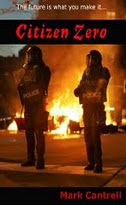Campaigning for the Right
to Thrive
By Mark Cantrell
Matters have long been coming to a head. Many of the themes hitting our societies today -- politically, economically -- have been bubbling beneath the surface for years and are now bursting forth to see fists shaken in outrage at our corporate masters. Today's global protests and occupations, of Wall Street, of the London Stock Exchange, prompted me to dig into the archives and dig out this little item. The article may be old, but the words and its subject retain their resonance...
THE United States of America has been found guilty gross violations of human rights. Somewhat embarrassing, you might think, in the 50th anniversary year of the United Nations Declaration of Human Rights. Yet its punishment will be far from severe – because its judges are the poor and the marginalised and therefore relatively easy to ignore.
Nevertheless,
the Economic Human Rights Campaign ’98 – as part of an ongoing struggle –
sought to highlight poverty as nothing less than a human rights abuse. The
scheme was orchestrated by the National Welfare Rights Union (NWRU), a US
anti-poverty group.
During
the summer, 48 members – all homeless, ex-homeless and welfare recipients –
took part in a bus tour that visited around 25 cities and towns. Styled, they
say, on the Freedom Rides of the Civil Rights era, these modern-day Freedom
Riders went looking for evidence to present to present before a tribunal in the
UN Church, organised by a broad spectrum of anti-poverty groups.
Welfare
reform, and the euphemistically termed economic restructuring, in recent years
has led to increasing hunger, homelessness and even death, the campaigners
claim. And, so far as the NWRU is concerned, this is something that can no longer
be tolerated – especially in a country as affluent as the United States.
“Until
poor and homeless people decide to come together and stand up, poverty and
homelessness will continue,” Cheri Honkala, co-president of the NWRU, told a
crowd of supporters in the city of Minneapolis. “People will continue to freeze
to death on sidewalks… We have to say that morally we will no longer tolerate
people dying like this in a land of plenty.”
This
is fighting talk from the very people who are the victims of the abuse that is
poverty. The NWRU was formed out of the Kensington Welfare Rights Union (KWRU),
a multi-racial group set up by people living in one of the city of
Philadelphia’s poorest districts. Its aim is to educate, organise, speak out
and campaign for the rights of welfare recipients, homeless people and the
working poor. The group is affiliated
to unions and the American Labor Party, and it shares the latter’s programme to
see that all people have the basic necessities of life -–food, clothing,
utilities, medical care, housing and a job at a decent living wage.
“We
believe that we have the right to thrive – not just barely survive,” the group
says.
Their
aims might not seem like much, until one learns their intention is no less than
the abolition of poverty. In an era of downsizing, ‘flexible labour’ and the
‘free’ market, this is not something that is likely to go down well in the
boardrooms of corporate America.
Much
is often heard of civil and political rights. The West likes to parade their
humanitarian credentials on this score, even if political expediency often
allows a blind eye to be turned to their actual realisation. Yet the concept of
economic rights is less familiar, though these rights are also enshrined in the
Declaration. The passages in question are Articles 23, 25 and 26, and they
underwrite the Freedom Riders’ campaign against violations of economic human
rights.
Article
23 reads: i) Everyone has the right to
work, to free choice of employment, to just and favourable conditions of work
and to protection against unemployment. ii) Everyone, without discrimination,
has the right to equal pay for equal work. iii) Everyone who works has the
right to just and favourable remuneration ensuring for himself and his family
an existence worthy of human dignity, and supplemented, if necessary, by other
means of social protection. iv) Everyone has the right to form and to join
trade unions for the protection of his interests.
Article
25: i) Everyone has the right to a
standard of living adequate for the health and well-being of himself and his
family, including food, clothing, housing and medical care and necessary social
services, and the right to security in the event of unemployment, sickness,
disability, widowhood, old age or other lack of livelihood, in circumstances
beyond his control. ii) Motherhood and childhood are entitled to special care
and assistance. All children, whether born in or out of wedlock, shall enjoy
the same social protection.
And
Article 26: i) Everyone has the right to
education. Education shall be free, at least in the elementary and fundamental
stages. Elementary education shall be compulsory. Technical and professional
education shall be made generally available and higher education shall be
equally accessible to all on the basis of merit… iii) Parents have a prior
right to choose the kind of education that shall be given to their children.
Nominally,
the political and civil rights of the poor may be intact. They do, after all,
have the freedom to go around and campaign, to agitate and argue for change.
And they are arguing for no less than a radical change in American society. Yet
poverty erodes these rights. As the campaigners point out, the poor are
marginalised: “Poor people have been excluded from debates, such as welfare
reform, which have had huge impact on our families. We are committed to tell
the stories of what is really happening in our lives and in poor communities,”
the KWRU says.
On
the whole, the poor – anywhere in the world – are seldom given a voice. They
are debated, discussed, their lives dissected, prodded, probed and generally
disapproved by academics and politicians and the media. Far from participating
in any debate, those in poverty are the object of debates; all too often
discussed as a problem, a threat to the liberties and the freedoms of society’s
more affluent members. And perhaps they are, for the Economic Rights Campaign
is seeking to challenge this.
Without
the basic rights that the campaign seeks to have recognised, what value are
human rights as a whole? They cannot be based on ability to pay. If nothing
else, the Economic Human Rights Campaign shows up the hollowness at the heart
of rhetoric on human rights. It also shows the determination of human beings to
fight for a more decent world. At the end of the day Human Rights thrive on the
determination of those fighting to put flesh on the paper bones.
Or,
as one of the Freedom Riders said: “When the one per cent who ‘make it’ refuse
the right to live to the other 99 per cent, the 99 per cent must stand up and
change things.”
Bradford,
18 July 1998
Copyright © July 1998. All Rights Reserved
Category: ESSAY



























0 comments:
Post a Comment